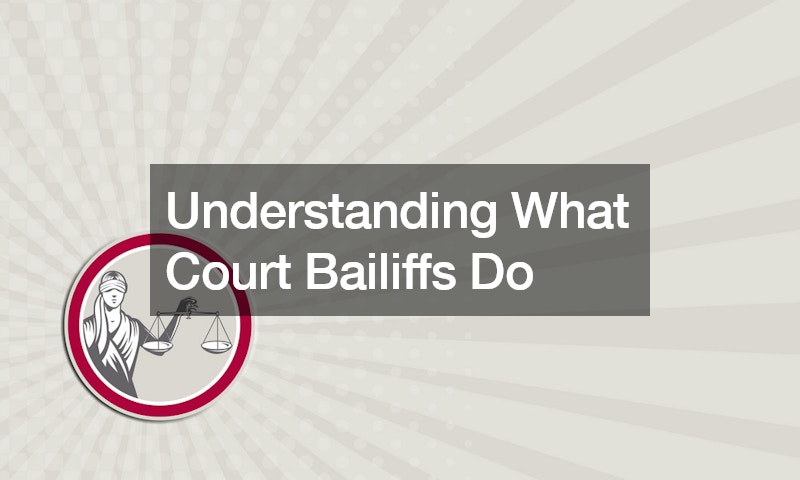
Cou Rt bailiffs play a vital role in the legal system, responsible for enforcing court orders and ensuring compliance with judgments. Their duties encompass a wide range of responsibilities, primarily focused on executing writs of possession, warrants of eviction, and other court-ordered actions. One of the primary functions of court bailiffs is to oversee the process of evicting tenants or occupants from a property following a court order. They ensure that the eviction is carried out in accordance with legal procedures and that the property is handed back to the rightful owner or landlord.
Court bailiffs play a critical role within the legal system, responsible for enforcing court orders, serving legal documents, and maintaining order within courtrooms.
In this article, we’ll delve into the duties and responsibilities of court bailiffs, highlighting their importance in ensuring the smooth functioning of the judicial process.
1. Enforcing Court Orders:
One of the primary responsibilities of court bailiffs is to enforce court orders issued by judges. This may include the seizure of property, eviction of tenants, or repossession of assets as ordered by the court. Bailiffs ensure that court judgments are carried out promptly and effectively, often working closely with law enforcement officers to execute such orders in a lawful and respectful manner.
2. Serving Legal Documents:
Court bailiffs are also tasked with serving legal documents, such as summonses, subpoenas, and writs, to individuals involved in legal proceedings. Serving these documents in a timely and accurate manner is crucial to ensure that all parties are properly informed of court proceedings and their legal obligations. Bailiffs must adhere to strict procedures and guidelines when serving documents to ensure that they are delivered correctly and legally valid.
3. Maintaining Order in Courtrooms:
During court proceedings, bailiffs play a vital role in maintaining order and security within courtrooms. They are responsible for ensuring that participants, including lawyers, witnesses, and spectators, conduct themselves appropriately and follow courtroom rules and etiquette. Bailiffs may intervene to prevent disruptions, enforce decorum, and escort unruly individuals out of the courtroom if necessary, thereby upholding the integrity and dignity of the legal process.
4. Providing Security:
Court bailiffs are responsible for ensuring the safety and security of court facilities, personnel, and visitors. They may conduct security screenings, monitor entrances and exits, and respond to security threats or emergencies as they arise. Bailiffs work closely with court security personnel and local law enforcement agencies to implement security protocols and mitigate risks, ensuring a safe and secure environment for all individuals within the courthouse.
5. Assisting Judges and Court Staff:
Bailiffs provide assistance and support to judges and court staff during proceedings, ensuring that courtrooms are set up properly, documents are organized, and proceedings run smoothly. They may help manage court dockets, escort witnesses to and from the courtroom, and assist with administrative tasks as needed. Bailiffs serve as a valuable resource for judges and court personnel, helping to facilitate efficient and effective courtroom operations.
6. Executing Arrest Warrants:
In cases where individuals fail to comply with court orders or evade legal proceedings, bailiffs may be tasked with executing arrest warrants issued by the court. They work closely with law enforcement agencies to locate and apprehend individuals named in arrest warrants, ensuring that they are brought before the court to face charges or receive sentencing as appropriate.
7. Providing Support to Litigants:
Court bailiffs may also provide support and guidance to litigants who are unfamiliar with court procedures or experiencing emotional distress. They may offer information about court processes, connect litigants with legal resources or support services, and provide reassurance and assistance as needed. Bailiffs play a crucial role in helping individuals navigate the complexities of the legal system, promoting access to justice and fairness for all parties involved.
Court bailiffs play a multifaceted role within the legal system, encompassing duties related to enforcement, security, administration, and support. Their presence is essential for maintaining order, upholding the rule of law, and ensuring that court proceedings are conducted fairly and efficiently. By carrying out their duties with professionalism, integrity, and impartiality, court bailiffs contribute to the effective functioning of the judicial process and the administration of justice in society.
Overall, court bailiff services play a crucial role in upholding the integrity of the legal system and ensuring that court orders are carried out effectively. Their expertise in enforcing judgments and maintaining order within the courtroom contributes to the smooth functioning of the justice system. Their role is essential in upholding the rule of law and ensuring the proper execution of legal judgments.

